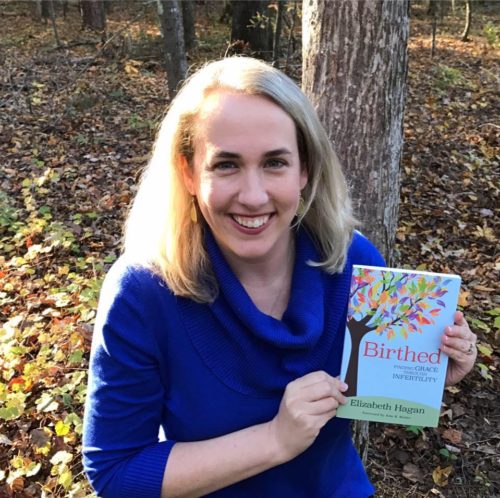 Since I first drafted what became Birthed: Finding Grace Through Infertility back in 2013, I've been on a journey of learning about publishing.
Since I first drafted what became Birthed: Finding Grace Through Infertility back in 2013, I've been on a journey of learning about publishing.
How does it work? What are the secrets (if any) to success? What are the best choices to make as a first time author?
As much as friends or colleagues offer you advice, until you go through the publishing once there are just some aspects of the business you can't understand.
Today, I want to share 5 misconceptions that I've learned through this process:
1.Publication will make you feel like a "real" writer.
I meet folks all the time now who want to talk to me about their idea for publishing a book.
Most of the time, they're good ideas, inspired ideas, the makings of books I'd love to read one day. These folks are serious too. They've drafted chapters. They've written outlines. They're even beginning to think about their target audience and crafting their narrative in that direction.
BUT, they say, "I can't find anyone to publish it." And they look so sad.
Because here's the thing. Writers often equate publication with success. Validation comes with someone "out there" saying our ideas are worthy enough to bind in a book.
Hear me say this, since publishing Birthed, I feel the same as I did pre-Birthed. I continue to blog like I always do. I write for other publications regularly as before. While I'm so glad my memoir was published, I really don't feel like I've suddenly arrived as a writer. I was just taking the next step of who I already was.
(If you have a good idea and completed book-- self-publication is not a bad idea! Don't let publishers define your worth. Go for it!)
2. You make money writing books.
If you go into writing books for the money, be prepared to live on food stamps. Of course, the big box publisher situation is different. But in small publisher land, there's no advances or if there is one it's very small. Additionally, know this: the standard publishing arrangement of what you receive per book you sell is somewhere in the range of $1 a book. Yes, you read me correctly. $1.
When I think about the hours that it takes to produce a quality project-- all of the revising, re-writing and painful meetings with editors, what you're getting is pennies on the hour if that.
This fact can be deflating, but if you're not in it for the money it doesn't feel so bad. My husband always jokes with me when I complain that I'm getting "stars in my crown" since I say that writing is part of my faith calling....
As an aside, be nice to your writing friends-- be willing to pay for their work. Don't expect you'll give them a copy for free. How would you feel about giving away your art for pennies?
3. When your book comes out, publishers send you on a book tour.
Publishers, especially small ones, send you nowhere. It's all you. You organize everything.
Folks have noticed that I've been busy though the past couple of months hosting book signings and events at churches talking about Birthed. Note: all of these engagements I arranged. Many of them came from personal asks. Emails that began like, "Hey, I just published a book, I'd love to come to ...." Others came from invitations of those already invested in my work because they edited drafts or endorsed it. Or mentors who followed my journey and wanted to support me.
Bottom line if you want to have a "book tour" in times like this draw upon your personal connections-- people who will make meaningful events for you happen. If you want to talk to me about visiting you, check out my schedule and send me a message! (See, I'm always looking for ways to make an ask).
4. The more live events you have the more successful your book becomes.
Seems logical, right? Events sell books. So events are good.
Events are good if you enjoy meeting people (which I do!). But books don't always sell at events. Amazon and e-books are powerful pulls especially when you've written a book about a topic that brings people shame, like infertility. Folks want to buy books like these from the comfort of their home.
Furthermore, if you talked to a crowd say of 100, the standard fundraising stats are that 3-5% of those present will respond. Yet, for example, I spoke to a church a couple of weeks ago of about 100 and sold 10 books. I was thrilled. It was great return (though doesn't seem like a lot) than normal.
It's important to mention here that events are costly to put together. You often have to spend money to drive or fly somewhere. You have to stay somewhere. All of this adds up (unless a group is supporting you).
Instead, what IS helpful for marketing though is big name endorsers-- writers/ speakers/ leaders with a bigger platform than you willing to put their nose out and say, "This is a great read because . . . "
5. People will be as excited about your book as you are. 
They won't, sadly. Though of course, some will like your mom . . .
It's important to realize that you've invested so much of your life in every word of your manuscript. You've painfully made the choice over verb tense, chapter headings and what type of table of contents you'll have. You've mulled over the title of the book, the cover design and how to word the description of yourself on the back.
And while you're proud of what you've pulled together (and you should be), just don't expect others to be invested in the details as you have. (Do you hear how many time I've used the word "you?"). It's your baby and as you send it out into world, it's time to let go. Others will respond as they will.
Those who care will surprise you. Those who ignore it will surprise you even more. But, by time you've reached publication, again I'll say it's not yours. Let it be. It will do what it needs to do without you worrying about it so much.
All in all I'm so thankful I published my first book and I hope my publishing career isn't over. I know I have more books in me. And if you have a book in you, let's talk off line. I'm know I have so much more to learn. I want to learn from you.